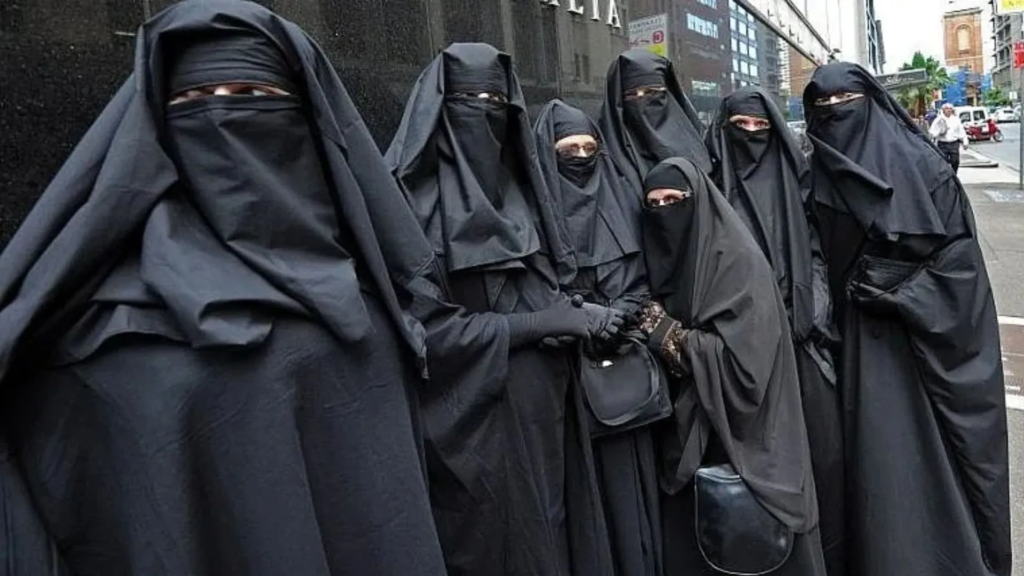On January 1, 2025, Switzerland is set to enforce a new law banning facial coverings in public spaces, commonly referred to as the “burqa ban.” This ban, a topic of considerable debate and controversy, has stirred discussions regarding individual freedoms, cultural values, and public security.
After narrowly passing in a 2021 referendum, the law will soon become a reality in Switzerland, joining similar restrictions enacted by other European countries.
Scope and Specifics of the Ban
The Swiss “burqa ban” applies to any facial covering in public spaces or publicly accessible private buildings, including shopping centers, restaurants, and transportation hubs. Coverings that conceal the nose, mouth, and eyes, such as burqas and niqabs traditionally worn by some Muslim women, are subject to restriction under this law.
Violators may face fines of up to 1,000 Swiss francs (approximately $1,144). With this move, Switzerland joins European nations like Belgium and France, which have enacted similar bans over the past decade.
The ban aligns with national voting procedures in Switzerland, where significant issues can be decided through referendums if 50,000 signatures are gathered. The referendum on facial coverings saw a narrow margin of approval, reflecting the mixed public opinion on this issue within Switzerland.
Read : Use of Suicide Pod Suspended in Switzerland Amid Criminal Investigation of Woman’s Death
The proposal for the law was introduced by the right-wing Swiss People’s Party, a group that previously led a 2009 campaign banning the construction of minarets. Despite resistance from some centrist and Green party members, the legislation was eventually passed, cementing the outcome of the referendum and setting the stage for its upcoming implementation.
Exemptions and Allowable Situations for Face Coverings
While the law generally restricts face coverings, several exemptions apply in specific circumstances. According to the Swiss government, face coverings will remain permissible in cases of health and safety, traditional customs, and weather-related needs.
Read : Meet Switzerland-based Rapper Nemo, Winner of Wiwi Jury 2024 with Song “The Code”
For example, coverings are allowed for medical reasons, personal protective equipment, or extreme weather conditions where warmth and safety are concerns. Additionally, the ban does not apply to airplanes or within diplomatic and consular premises, where international conventions often dictate protocol.
The Swiss government has clarified that covering the face will also be allowed in places of worship and other sacred sites, ensuring that religious practices within private spaces are respected.
Beyond these conditions, exceptions have also been made for artistic, entertainment, or advertising purposes, provided they align with public order and receive prior authorization from the relevant authorities.

Moreover, coverings are permitted in situations related to freedom of expression and assembly, as long as prior approval is obtained and public order remains intact. These exemptions allow for a certain level of flexibility in implementing the ban, accommodating unique situations and ensuring that specific practices are respected under Swiss law.
Debate and Broader Context: Public Opinion, Cultural Tensions, and Immigration
The burqa ban has not only ignited debates within Switzerland but also echoes a broader European conversation surrounding cultural integration, public security, and religious expression. Critics argue that the law disproportionately affects Muslim women, particularly those who choose to wear the burqa or niqab as part of their religious practice.
Muslim organizations have expressed concern, calling the ban a targeted restriction on religious freedom and emphasizing that burqas and niqabs are uncommon in Switzerland. They argue that the ban reinforces negative stereotypes and discriminates against a small minority within the country.
Supporters of the ban, including the Swiss People’s Party, argue that the legislation is essential for public security and promotes social cohesion by enforcing transparency in public interactions. They believe the ban will help address concerns about the visibility and integration of non-Western customs within Swiss society.
Recent developments, such as housing shortages, infrastructure pressures, and shifts in public opinion on immigration, have contributed to a climate where many Swiss citizens prioritize policies they perceive as reinforcing national identity and social stability.

Switzerland’s law follows similar legislative trends in Belgium, France, and Denmark, countries that have enacted comparable bans amid increasing immigration and demographic shifts. In these nations, facial covering bans were introduced partly to address concerns related to public safety and the visibility of religious symbols in public spaces.
For instance, in France, where a 2011 ban prohibited full-face coverings in public, similar arguments were presented regarding cultural integration and social transparency.
Switzerland’s choice to move forward with a national ban underscores the country’s alignment with other European states on these issues and highlights the Swiss political process that emphasizes direct public involvement through referendums.
Switzerland’s upcoming burqa ban reflects a complex intersection of security, cultural integration, and individual freedoms. As January 1 approaches, the country prepares to implement this new legislation, with carefully outlined exemptions to accommodate specific situations.
This ban not only contributes to the evolving discourse on national identity and religious expression but also positions Switzerland alongside several European countries grappling with similar issues amid shifting societal dynamics.

